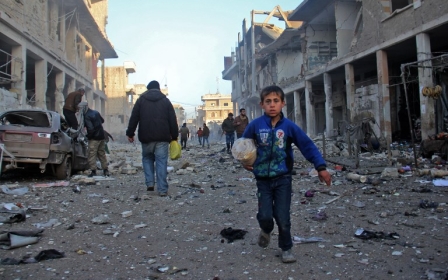Turkish army expands deployment in Syria's northwest, say rebels

The Turkish army is expanding its deployment in northwest Syria with the goal of encircling a Kurdish enclave and reining in Russian strikes in the Idlib border province under a deal to reduce clashes, rebels and witnesses said on Sunday.
A convoy of Turkish army troops entered Syria near the Bab al-Hawa border crossing on Thursday in the first such deployment since last year when Ankara launched a major ground and air offensive to clear Islamic State militants from its last stretch of border with Turkey.
At least four convoys carrying scores of armoured vehicles and equipment have been stationed in several locations in the first phase of a deployment that is expected to deepen inside rebel-held Idlib, opposition sources said.
"Nearly 200 troops are now stationed in areas that separate territory under control of Kurdish groups and opposition groups," said Ibrahim al Idlibi, a military adviser in the opposition's Free Syrian Army (FSA).
Witnesses said Turkish bulldozers were working around the clock, digging fortifications and setting up observation posts.
A new deployment of Turkish armoured vehicles and personnel arrived along the Syrian border on Saturday, positioned on the Turkish side, witnesses said.
Turkey was expanding its presence in an area where it hopes to act as a barrier to Kurdish ambitions of uniting the isolated Afrin region, north of Idlib, with the rest of a self-declared autonomous Kurdish zone in the country’s north.
Turkish positions near Samaan castle in the Sheikh Barakat mountains of the fertile, olive-growing province put them just a few kilometres from Kurdish militia forces based in Jendaris.
"Turkish forces are still in a state of advancing and expanding," said Mustafa al Sejari, a Free Syrian Army official.
Turkey says its operations there, along with the Syrian rebel groups it backs, is part of a deal it reached last month with Russia and Iran in Kazakhstan to reduce fighting between insurgents and the Syrian government.
Syria on Saturday denounced the Turkish incursion saying it was a flagrant violation of its sovereignty and demanded Ankara pull its troops.
The Turkish incursion into the province dominated by the Tahrir al Sham group, whose backbone is the ex-Nusra Front, Syria’s former al-Qaeda offshoot, has run smoothly.
'Positions as agreed'
Rebel sources familiar with the deployment said the operation was preceded by weeks of coordination between Tahrir al Sham with Turkish intelligence officers to ensure no clashes happened.
Free Syrian Army rebel groups said the goal of the campaign was to push deeper into the province, with the expansion of supply lines and observation posts. The militants would be retreating further south in a phased withdrawal.
"The Turks will be taking up positions 40km deep inside Idlib as agreed," Idlibi said.
The goal was ultimately to create a contiguous stretch that goes from Bab al-Hawa all the way to Jarablus city, west of Euphrates River and as far south as the city of Bab, widening a pocket of the northern border under the control of Turkey-backed rebels.
Many residents in the towns of Idlib province, where more than two million people live, have welcomed the arrival of Turkish troops.
They are seen as a bulwark against heavy Russian and Syrian army bombardment to crush the rebel province that would cause massive devastation and high civilian casualties.
"The Turks presented the factions of the FSA, the military and logistical support so that Idlib escapes the fate of Deir Ezzor or Raqqa," said Colonel Abdul Jabar Akaidi, a senior commander in the FSA in the north.
Heavily populated Idlib has been the target of hundreds of strikes by the Russia and Syrian air forces in the past year that have killed hundreds of civilians and destroyed hospitals and civil defence centres.
Six months of relative peace under a Turkish-Russian understanding that gave a temporary reprieve to thousands of people was shattered when Russia resumed an intensive bombing campaign last month when militants launched an offensive against Syrian army positions.
On Saturday in southern Idlib, jets believed to be Russian killed at least three civilians and injured scores when bombs struck the outskirts of Maarat al Numan.
The air raids also targeted a camp run by Failaq al Sham, a Turkey-backed FSA group in Kafr Ruma village, where a strike last month killed dozens of its fighters.
New MEE newsletter: Jerusalem Dispatch
Sign up to get the latest insights and analysis on Israel-Palestine, alongside Turkey Unpacked and other MEE newsletters
Middle East Eye delivers independent and unrivalled coverage and analysis of the Middle East, North Africa and beyond. To learn more about republishing this content and the associated fees, please fill out this form. More about MEE can be found here.




